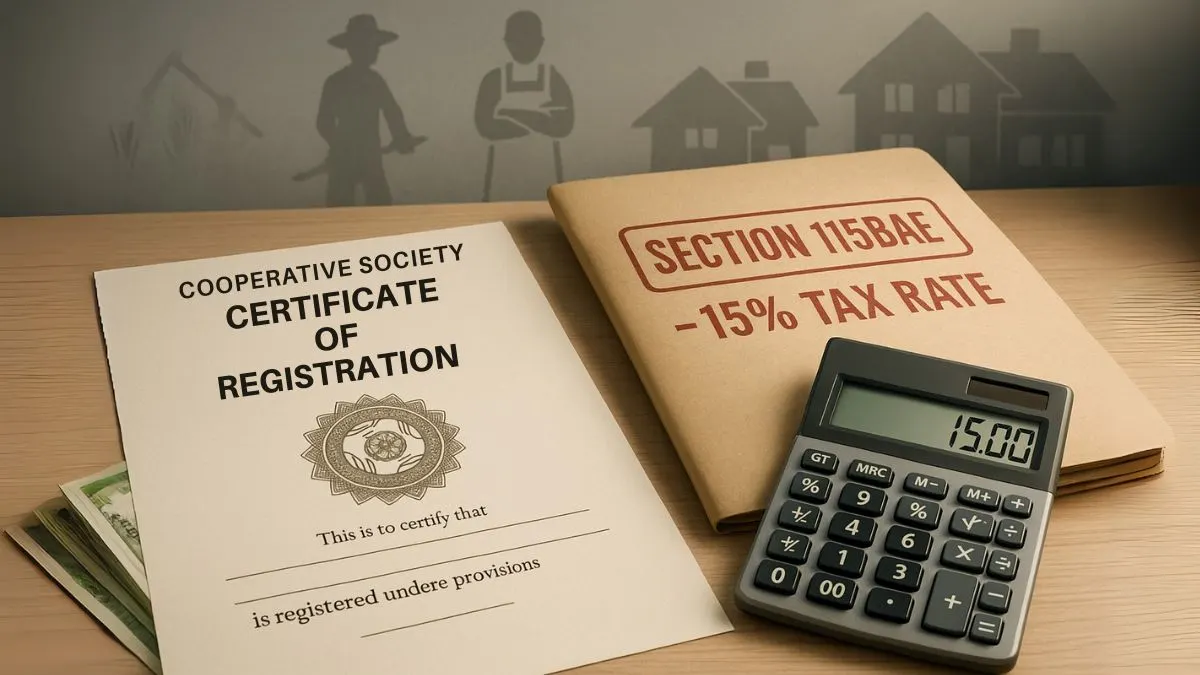
India’s tax framework has been evolving to promote business growth and competitiveness. Over the past few years, special tax regimes were introduced for domestic manufacturing companies to encourage investment and industrial development. Following the same vision, the government introduced Section 115BAE of the Income Tax Act, which provides a concessional tax regime for new manufacturing co-operative societies.
Under this section, income under Section 115BAE shall be taxable @15%, which is among the lowest corporate tax rates available in India, making it highly beneficial for newly established co-operative societies engaged in manufacturing.
What is Section 115BAE of Income Tax Act?
Section 115BAE was inserted to give tax relief to new manufacturing co-operative societies incorporated on or after April 1, 2023. It is specifically designed to boost industrial activity in the co-operative sector, which plays a vital role in India’s rural and semi-urban economy.
According to the provision:
- Tax on income of certain new manufacturing co-operative societies will be levied at a flat 15% rate.
- The concessional rate is applicable only if the society is engaged in manufacturing or production of goods.
- Additional surcharge & cess are applicable as per existing rules.
Key Features of Section 115BAE
- Tax Rate
- Income under Section 115BAE shall be taxable @15%.
- This is subject to surcharge (10%) & health & education cess (4%).
- Effective tax rate works out to approximately 17.16%.
- Applicability
- Only new manufacturing co-operative societies established on or after 01-04-2023.
- Must commence manufacturing or production before 31-03-2024 to claim the benefit."
- Exclusions
- Co-operative societies engaged in trading, mining, or services are not eligible.
- Income from non-manufacturing activities will not enjoy concessional tax treatment.
- No Incentives
- Just like the concessional regime for companies under Section 115BAB, co-operative societies opting for Section 115BAE cannot claim other deductions or incentives under Chapter VI-A (except those specifically allowed).
Also Read: New Manufacturing Companies Tax Rate at 15%
Objective Behind Section 115BAE
The government’s aim is to provide a level playing field for co-operative societies alongside corporate entities. Earlier, special tax benefits like Section 115BAB (for companies) were introduced, but co-operative societies were left out.
To correct this gap & ensure inclusivity, Section 115BAE was introduced so that new co-operatives engaged in manufacturing can also avail a 15% concessional tax rate.
This move strengthens:
- Industrial development in semi-urban & rural areas.
- Employment opportunities through co-operative enterprises.
- Balanced growth of the economy.
Example to Understand Section 115BAE
Suppose XYZ Manufacturing Co-operative Society is incorporated in May 2023 & begins production of consumer goods.
- Its taxable income for FY 2023-24 is ₹5 crore.
- Under Section 115BAE, tax on income of certain new manufacturing co-operative societies will be 15%, i.e., ₹75 lakh.
- Surcharge @10% = ₹7.5 lakh.
- Health & education cess @4% on (₹75 lakh ₹7.5 lakh) = ₹3.3 lakh.
- Total tax liability = ₹85.8 lakh.
This is far lower than the normal co-operative tax regime, which could exceed 30%.
Also Read: Section 115BAD of the Income Tax Act: A Game Changer for Cooperative Societies
Comparison with Other Tax Regimes
- Normal Co-operative Tax
- Progressive tax rates ranging from 10% to 30%.
- Higher effective tax burden.
- Section 115BAE
- Flat 15% tax rate, minimal burden.
- Best suited for manufacturing co-operatives.
- Section 115BAB (Companies)
- Similar 15% concessional regime for domestic manufacturing companies.
- Section 115BAE ensures co-operatives enjoy similar benefits.
Compliance and Conditions for Availing Benefit
To claim Section 115BAE, the co-operative society must:
- Be newly incorporated on or after 01-04-2023.
- Be engaged only in manufacturing or production activities.
- File income tax return within due dates prescribed under Section 139(1).
- Not claim other exemptions or deductions under Income Tax Act.
- Opt for Section 115BAE at the time of filing return; once opted, it cannot be withdrawn.
Challenges and Practical Issues
While the section provides an attractive concessional tax rate, there are some challenges:
- Strict eligibility conditions – Only new co-operatives incorporated after April 2023 qualify.
- No deductions allowed – Even if the society invests in R&D or backward areas, it cannot claim additional deductions.
- Limited scope – Service-oriented or trading co-operatives are excluded."
However, despite these limitations, Section 115BAE is a game-changer for manufacturing co-operatives.
Also Read: A Special Tax Route for Domestic Companies
Conclusion
Section 115BAE of Income Tax Act provides a much-needed concessional tax regime for co-operative societies engaged in manufacturing. Income under Section 115BAE shall be taxable @15%, making it one of the lowest tax rates in the Indian tax framework. It ensures tax on income of certain new manufacturing co-operative societies is equitable with domestic companies, encouraging more co-operatives to enter the manufacturing sector.
This initiative promotes industrial growth, enhances employment, and ensures the co-operative model thrives in India’s economic ecosystem.
Planning to set up a new co-operative society & want to save tax under Section 115BAE? At Callmyca.com, our tax experts can help you structure your society for maximum benefit. Don’t miss this 15% tax regime!











